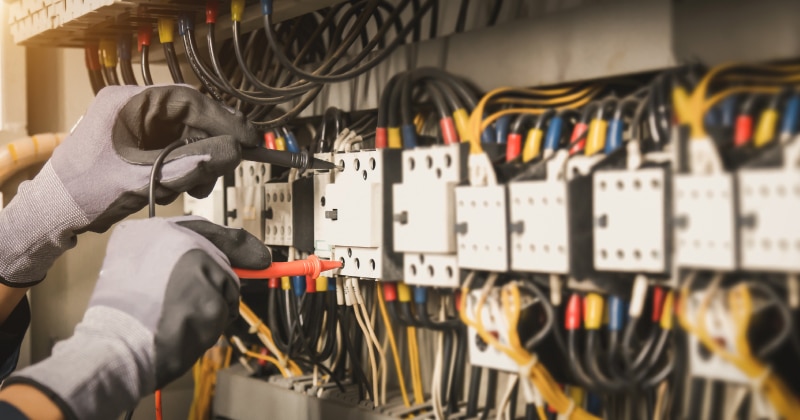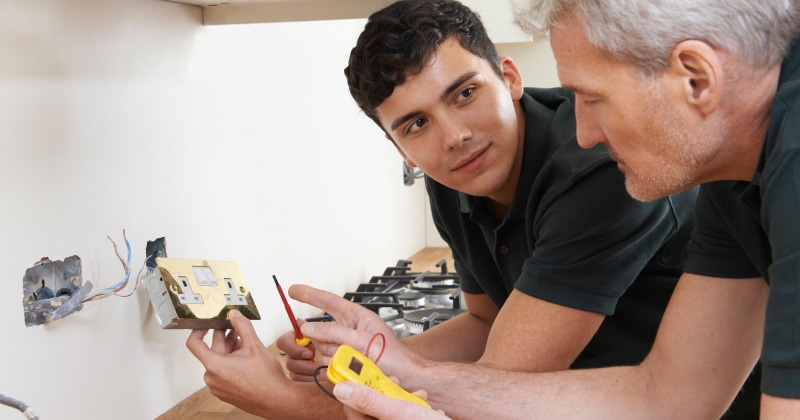Top 22 Electrical Tools for Your Apprentice Electricians
Electrical tools are expensive but essential for an electrical apprentice. That’s why we put together the ultimate list of electrical tools every apprentice should have on day one.

Content Director
Beginning a career as an apprentice electrician is no small thing. There’s a lot to learn. And you need to make sure you have the right tools to do the job.
But if you’re new to the trade, what tools are the most essential?
Electrical tools are expensive. You’ll want to start building your collection by focusing first on the tools you’ll need most frequently.
That’s why we put together a list of electrical tools every apprentice should have on day one.
This is your essential, quick-start tool list. We’ve even included links to online stores where you can buy each item. Plus, there’s a handy next-steps list at the end of this article.
Here’s how to create the perfect starter toolkit.
Why Apprentice Electricians Need a Well-Stocked Toolbox
As an apprentice electrician, you’re in learning mode. That’s the point of an apprenticeship. But you’re also actively working electrical jobs.
Apprentices can complete a range of electrical tasks while under the supervision of a master electrician. Typical apprentice-level tasks include things like:
- Installing wiring systems
- Repairing electrical infrastructures
- Replacing transformers, switches, and other electrical components
Most electricians spend years as an apprentice to learn the skills needed to work independently. Once you successfully complete your apprenticeship, you’ll be able to start working toward becoming a Journeyman Electrician.
Along the way, you’ll want to build up your professional toolkit. You never want to arrive at a job site and discover you don’t have the right tools to do the work.
The Ultimate Electrical Apprentice Tools List
When you’re just starting out, you don’t necessarily need all the tools a Journeyman or Master Electrician might have in their collection. However, there are some essential tools you should have right from the beginning.
The following are all the basic tools you’ll want to have on your first day of work as an apprentice electrician.
1. Phillips Head Screwdriver
Because Phillips head screws are extremely common, you’ll be using your Phillips head screwdrivers on almost every job.
Bare minimum, you’ll want to have a #1 Phillips screwdriver for smaller screws and a #2 Phillips screwdriver for standard screws.
Because you’re working with electrical components, be sure to choose screwdrivers that are fully insulated.
2. Flat-Head Screwdriver
You’ll also regularly deal with flat-head screws, which is why you should have a high-quality set of screwdrivers.
You’ll save a lot of time on the job if you always have the right screwdriver. You’ll need flat-heads when taking off switchboard covers and installing new electrical equipment.
Because you’ll likely need a variety of sizes, you should consider purchasing a set of screwdrivers. With the right set, you can kill two birds with one stone. A good set will include both flat-head and Phillips head screwdrivers.
Screwdriver sets are usually cost-effective, so this is a great way to save money while building up your electrician’s toolkit.

3. Wire Strippers
You’ll need to be able to strip the insulation off of electrical wires on a regular basis. So, you’ll need a good set of wire strippers.
Be sure to get wire strippers with a comfortable grip, as this tool is likely to get plenty of use.
4. Needle-Nose Pliers
Needle-nose pliers will make your job easier when you’re working in small spaces or dealing with small objects. They allow for a solid grip when larger pliers wouldn’t fit.
They come in handing in hard-to-reach places.
5. Adjustable Pliers
While the small, tight grip of your needle-nose pliers is perfect for small objects, sometimes you’ll need a wider grip.
That’s when you’ll want a good-quality pair of adjustable pliers.
Adjustable pliers can accommodate both large and small objects, making them one of the most versatile tools an electrician can own.
When choosing a pair to buy, be sure to choose pliers made from high-carbon steel. You’ll appreciate the extra durability when on the job.
6. Side-Cutting Pliers
When you need to cut wires to a specific length, you’ll typically want to reach for your side-cutting pliers. This is another critical item on our list of electrical apprentice tools.
Because you’ll use them often, it’s worth investing in a pair that’s comfortable and easy to grip.
7. Channel Locks
Technically, channel locks are another type of plier. You’ll need two channel locks of the same size to tighten some fittings.
There are different sizes available, but you won’t need multiple sizes on day one of your apprenticeship. Stick with a standard-size pair of channel locks to start, such as 12 inches.
Once you spend time working with more experienced electricians, you’ll have a better idea of other sizes you might want to add to your toolkit.
8. Nine-Inch Pliers
There’s one last pair of pliers every apprentice electrician should buy: nine-inch pliers.
With a long handle length, you’ll be able to reach into tight spaces and grip with ease. You’ll use these regularly for a wide variety of tasks.
9. Voltage Tester or Multimeter
You’ll use this tool to check voltage levels and determine the presence of an electric current. Most voltage testers are easy to use and offer all the accuracy you’ll need while you’re an apprentice.
You should be fine with a basic model.
If you have a comfortable budget, there is one thing to keep in mind. You probably don’t need to invest in an expensive digital multimeter just yet. That purchase can wait until you’ve spent time working around master electricians.
The added experience will also give you the chance to see what type of voltage tester more seasoned electricians prefer.
High-end multimeters can cost well over $1,000. For now, a decent electrical meter that checks volts, ohms, continuity, and amps will serve you well.
10. Plug Testers
Another essential electrical testing tool apprentice electricians should carry is a plug tester.
This tool is a bit simpler than the voltage tester. You plug it into an electrical outlet, and it will tell you if the outlet is working as it should. It’s a must-have for detecting common wiring problems.
Anytime you install electrical wiring, you’re going to need to test each outlet. You’ll use this tool frequently.
Plug testers tend to be cheap.
11. Measuring Tape
You’ll end up using your measuring tape often. Because this is going to be such a heavily used item, it’s worth spending a little extra. Be sure to get a high-quality measuring tape that won’t rip or bend too easily.
It’s also helpful to have writing on both sides of the tape.
You’ll need a measuring tape that’s at least 25 feet long. That’s long enough to take measurements for both commercial and residential jobs.
12. Keyhole Saw
A keyhole saw is designed to cut through drywall. It’s not powered, like a Sawzall (or reciprocating saw). But for now, this tool will serve your needs.
If you find that you’re cutting through drywall a lot, you can add a Sawzall to your toolkit.
13. Torpedo Level
You’ll need a torpedo level to determine if a surface is flat and to check angles when doing installation work. Since you’ll be working with a lot of metal surfaces as an electrician, it’s worth investing in a magnetic torpedo level.
You’ll also want to opt for one made from aluminum. The cheaper plastic levels don’t last long and are harder to use.
14. Utility Knife
A utility knife is a practical tool electricians use to make precision cuts.
You’ll need a sharp blade to do the job. Dull blades won’t give you a clean cut.
You can choose a fixed utility knife with a retractable blade or a foldable blade—either works well. Just go with the type of utility knife you’ll be most comfortable using.
15. Hammer
You won’t use a hammer on every electrical job. Still, this tool will come in handy more often than you might realize.
Be sure to purchase a sturdy flat claw hammer. That way, you’ll be able to pry as well as hammer.
16. Hacksaw
When you’re installing wiring, you might have to cut through a variety of materials, including wood, particleboard, and metal.
You’ll want a reliable hacksaw on hand.
There are both too-cheap and too-pricey hacksaws out there. At this point in your career, you’ll be in good shape with a standard high-tension hacksaw.
This tool will let you cut through everything from copper pipes to hardwood.
17. Spade Bits
A spade bit is a wood-boring drill bit that removes material from a borehole.
You’re not necessarily going to use these on day one. But when working on wood-framed buildings, you’ll need spade bits to help you run wires through your drilled holes.
18. Wrenches
You’ll use a variety of wrenches during your apprenticeship. The one that can help you the most as you’re learning the ropes is an adjustable wrench.
These tools are a must-have when dealing with any non-standard nuts or bolts. You can simply adjust the wrench to the exact size you need.
19. Nut Drivers
Nut drivers are specially designed to tighten nuts and bolts. Unlike pliers and wrenches, they’re shaped more like a screwdriver. They work well for tightening screws in tight spaces where pliers or a wrench wouldn’t fit.
You don’t necessarily need nut drivers right away. But they’re something that will make your job a lot easier when you’re able to add them to your toolbox.
20. Pencils and Markers
An experienced electrician will always have a few pencils on hand to make light marks on walls or when drawing on plans. As an apprentice, you’ll want to have pencils, too.
When you need to make more visible markings on cables, metal, and other materials, your pencil won’t do the trick. That’s why you should also carry a few permanent markers.
Markers are great for materials that will be painted over or will be hidden in the wall behind drywall.
21. Gloves
Anytime you’re working with sharp materials, you’ll want to wear a pair of high-quality gloves.
They should be thick enough to protect your hands. They should also provide good slip resistance, so you won’t lose your grip when pulling wire or cable.
22. Tool Pouch
And finally, to complete our list of electrical apprentice tools, you’ll want to purchase an electrician’s tool pouch. This will make it easy to keep your most commonly-needed tools in arm’s reach.
If you want to buy a long-lasting pouch from day one, go for a leather tool pouch. Leather won’t rip or tear, and it will hold up to the elements.
If you’re not ready to invest in a forever electrician’s tool pouch just yet, go ahead and start with nylon. Just be aware that it might only last a year or two before you need to replace it.

Creating Your Starter Toolbox
The right tools are essential for your success as an electrician. Sure, the price tag for filling your toolbox can be substantial. But you’ll have the assurance of showing up for jobs with everything you need to do the work.
That’s priceless.
Don’t make the mistake of being unprepared. Even if you can’t afford every tool on this list, keep an eye out for sales and start buying what you can afford. In the long run, this is an investment worth making.
Here are some next steps to get started on your path to an electrical apprenticeship.
- Talk to an experienced electrician. Ask what tools they recommend—what’s essential, as well as which brands they trust. Let them know you’re just starting out. They’ll be able to tell you what to get first.
- Make your initial list. Write out all the tools you’ll need on day one. Even if you’re not normally a list person, there will be too many to try to remember them all without writing them down.
- Price out your essentials list. Once you have a full list, start shopping. We recommend that you do a fair bit of price comparison online before you start buying. Sales, competitive pricing, and discounts can save you a lot of money but may force you to buy from several different stores.
- Budget to continue to build out your toolbox. Once you have all your starter tools, you’re not done. You’ll want to continue to add to your toolbox, so you’ll need to start setting aside money. Planning ahead will allow you to make purchases as you see the need, ensuring you’re always well-equipped.
Ashley’s professional experience includes content creation of all kinds, from articles and infographics to websites and whitepapers. When she’s not working, she enjoys dark coffee, dad jokes, and fiction—mostly horror and urban fantasy.

Business Solutions For Field Service Pros
EverPro offers specialized solutions designed for home and field service professionals. We’ve got the business tools to help you get the job done.



